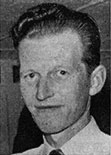1952 Summer Olympics / Athletics - 50 km walk (men)
|
|
|||||||||

|
|||||||||
| sport | athletics | ||||||||
| discipline | 50 km walk | ||||||||
| gender | Men | ||||||||
| Attendees | 31 athletes from 16 countries | ||||||||
| Competition location |
Helsinki Olympic Stadium (start and finish) |
||||||||
| Competition phase | July 21, 1952 | ||||||||
|
|||||||||

The men's 50 km walk at the 1952 Olympic Games in Helsinki was held on July 21, 1952. 31 athletes took part, 28 of whom were able to finish the competition. The start and finish was the Olympic Stadium in Helsinki .
Olympic champion was the Italian Giuseppe Dordoni . He won in front of the Czechoslovak Josef Doležal and the Hungarian Antal Róka .
Existing records
| World best | 4:23:40 h |
Josef Doležal ( Czechoslovakia )
|
Poděbrady , Czechoslovakia | 4th August 1946 |
| Olympic record | 4:30: 41.4 h |
Harold Whitlock ( Great Britain )
|
Berlin , Germany | August 5, 1936 |
Note: World records are not set in 50 km walking because of the different track conditions.
Routing
The starting point was the Olympic Stadium . After leaving the stadium, the route led north via main road 45. The Olympic Village in Käpylä and Helsinki-Vantaa Airport were passed and the city of Vantaa with its Tikkurila district crossed. There was a turning mark near the village of Tuusula . From there it was the same way back to the Olympic Stadium. Apart from the short sections on the cinder track in the stadium, the entire route ran over asphalt.
Conducting the competition
There were no preliminary fights. All starters competed together on July 21st.
Race and final result
Date: July 11, 1952, 2 p.m.
The 1948 Olympic champion , John Ljunggren, led the field up to kilometer 30. However, Ljunggren had to pay tribute to the cold and the high speed and was replaced by Giuseppe Dordoni, who had initially been very reserved and then came up more and more. Dordoni, European champion from 1950 , then extended his lead to more than three minutes until the finish line. He won the undisputed gold medal in front of the world record holder Josef Doležal - two years later in Bern, European champion in 10,000 meters - and the Hungarian Antal Róka. Ljunggren ended up ninth and Harold Whitlock, the 1936 winner , came eleventh. Harold Whitlock's brother, Rex Whitlock, was nearly seven minutes faster and finished fourth. Giuseppe Dordoni improved Harold Whitlock's Olympic record by more than two and a half minutes. The world best was again about four and a half minutes better.
literature
- Ekkehard zur Megede , The History of Olympic Athletics, Volume 2: 1948–1968, Verlag Bartels & Wernitz KG, Berlin, 1st edition 1969, SS 88f
Web links
- SportsReference 50km Walk , accessed September 27, 2017
- Official report p. 306f, engl. (PDF), accessed on September 27, 2017
- La XV olimpiade: la prima medaglia d'oro per l'Italia conquistata da Giuseppe Dordoni , published on June 30, 2012 on youtube.com, accessed on September 27, 2017
Individual evidence
- ↑ IAAF Statistics Handbook, Berlin 2009, page 566 ( Memento from June 29, 2011 in the Internet Archive )
- ↑ Official report sketch of the course, p. 306 (engl.)
- ^ Official report p. 266, engl. (PDF)
- ↑ Official Time-table report, pp. 256 - 257 (English)